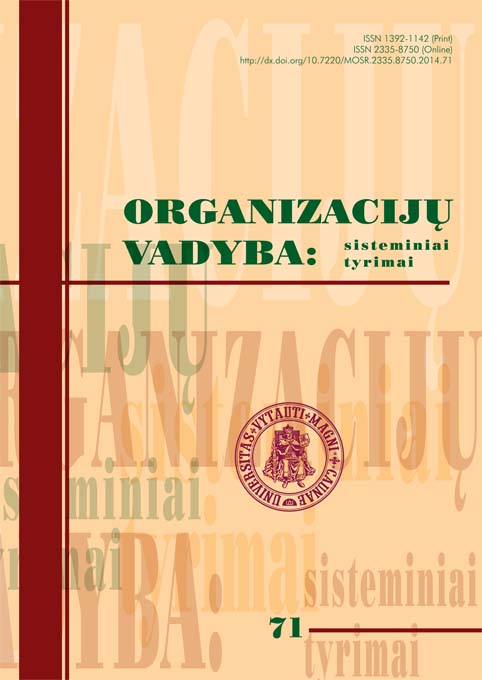Organizacijos transformavimosi į intelektualią kryptys: socialinio ir intelektinio kapitalo teorijų apžvalga
Directions of organization‘s transformation into intellectual organization: review of social and intellectual capital theories
Author(s): Gintarė Žilaitytė, Jolita VveinhardtSubject(s): Economy
Published by: Vytauto Didžiojo Universitetas
Keywords: Socialinis kapitalas; Intelektinis kapitalas; Inovatyvi organizacija; Intelektinis verslas Social capital; Intellectual capital; Innovative organization; Intellectual business
Summary/Abstract: Ekonomiškai stiprios ar ekonominio proveržio siekiančios, inovatyvių aukštųjų technologijų įmonių veiklą skatinančios, intelektinio verslo svarbą akcentuojančios valstybės yra daugiau linkusios į socialinės transformacijos proceso mokslinius ieškojimus, tobulinimo modelių paieškas. Viso pasaulio mastu, skirtinguose kontinentuose atlikti socialinio kapitalo sandaros bei raiškos tyrimai yra tvirtas pamatas intelektualaus, veržlaus žmogiškojo kapitalo tyrimams, organizacinių pokyčių, vidinių transformacijų procesams identifikuoti. Straipsnyje siekiama atskleisti teorinių žinių suvokimą bei išryškinti organizacijos transformavimosi į intelektualią kryptis, atliekant socialinio ir intelektinio kapitalo teorijų apžvalgą. In order to highlight the factors of the formation of social and intellectual capital in the organization, the interconnection and the influence of the transformation process on the process of innovative activities within the organization, the problem was formed as a question: what are the interconnections between social and intellectual capital and how to develop them in the context of innovative activities of the transformation into an intelligent organization? Reviewing the theories of social and intellectual capital in the article, the constituents of social capital are discussed, the structure of intellectual capital is elaborated, interconnections between social and intellectual capital in the context of transformation of the organization are highlighted. Social capital is being formed by concerned participants acting in networks with different characteristics: bonding, bridging and linking. Participants of bonding social network are closely interconnected, they feel comfortable and experience the emotion of attachment. Participants of bridging social network have more personal possibilities due to the strong interconfidence among network participants, which determines individual future perspectives. Linking social network is identified as the connection based on organizational relationship. Such network links individuals with different status and makes them hear each other’s interests and needs and unite with the aim to initiate organizational changes. The result of social capital accumulation process depends on such components as development of social relations, declusterization, diversification of social networks, and coordination of individual, group and intergroup interests. Intellectual capital, being immaterial, acquires economic expression in the organizational processes; however, the list of its components is still in the process stage. There is no universally acknowledged theory that would define the content of intellectual capital, but such elements as motives, connections, knowledge, realized and unrealized skills, values, emotional intellect and wisdom, which is the result of human motivated volitional efforts, might be distinguished.
Journal: Organizacijų vadyba: sisteminiai tyrimai
- Issue Year: 2014
- Issue No: 71
- Page Range: 125-140
- Page Count: 16
- Language: Lithuanian

